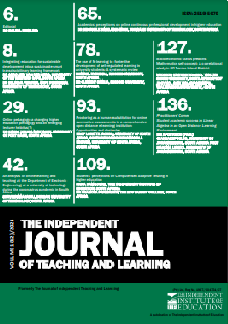An analysis of online learning and teaching at the Department of Electronic Engineering at a university of technology during the coronavirus pandemic in South Africa
DOI:
https://doi.org/10.17159/ijtl.v18i2.17295Keywords:
COVID-19 impact, higher education institutions, online teaching, Learning Management System (LMS)Abstract
The Department of Electronic Engineering at a South African University of Technology is currently conducting a research study to investigate the challenges associated with online teaching during the COVID-19 epidemic. Specifically, the study focuses on the perspective of educators in this context. In response to the outbreak, governments worldwide implemented nationwide lockdowns to curb the spread of the virus, leading educational institutions, including universities, to cease in-person instruction. This sudden shift disrupted the educational system, necessitating a rapid transition from traditional face-to-face teaching to online methods to fulfill the curriculum requirements. As faculty members encountered various difficulties in adapting to online teaching pedagogy, the research study concentrates on them as the primary participants. The research study provides recommendations that offer valuable guidance for improving the effectiveness of online teaching practices which may be applied outside of the pandmic to most online teaching pedagogies.
References
Abdulkareem, T.A. & Eidan, S.M. (2020) Online Learning for Higher Education Continuity (during COVID-19 Pandemic). International Journal of Youth Economy 4(2) pp.125-134. DOI: https://doi.org/10.18576/ijye/040206
Ahmad, S., Wasim, S., Irfan, S., Gogoi, S., Srivastava, A. & Farheen, Z. (2019) Qualitative v/s. Quantitative Research- A Summarized Review. Journal of Evidence Based Medicine and Healthcare 6(43) pp.2349-2570. DOI: https://doi.org/10.18410/jebmh/2019/587
Bania, J. & Banerjee, I. (2020) Impact of Covid-19 Pandemic on Higher Education: A Critical Review. Higher Education after the COVID-19 crisis. Global University Network for Innovation pp.1-12.
Berry, B., Doucet, A. & Owens, B. (2020) Teacher Leadership in the Aftermath of a Pandemic: The Now, The Dance, The Transformation. s.l.:Education International.
Calonge, D.S., Connor, M., Hultberg, P., Shah, M.A. & Aguerrebere, P.M. (2022) Contactless Higher Education: A SWOT Analysis of Emergency Remote Teaching and Learning during COVID-19. Journal of Educational Studies and Multidisciplinary Approaches 2(1) pp.18-36. DOI: https://doi.org/10.51383/jesma.2022.22
Carrillo, C. & Flores, M.A. (2020) COVID-19 and teacher education: a literature review of online teaching and learning practices. European Journal of Teacher Education 43(4) pp.466-487. DOI: https://doi.org/10.1080/02619768.2020.1821184
Gherhes, V., Stoian, C.E., Fărcasiu, M.A. & Stanici, M. (2021) E-Learning vs. Face-To-Face Learning: Analyzing Students’ Preferences and Behaviors. Sustainability 13(8) p.4381. DOI: https://doi.org/10.3390/su13084381
He, W. & Xiao, J. (2020) The Emergency Online Classes During COVID-19 Pandemic: A Chinese University Case Study. Asian Journal of Distance Education 15(2) pp.21-36.
Hollweck, T. & Doucet, A. (2020) Pracademics in the pandemic: pedagogies and professionalism. Journal of Professional Capital and Community 5(3/4) pp.295-305. DOI: https://doi.org/10.1108/JPCC-06-2020-0038
Hox, J.J. & Boeije, H.R. (2005) Data Collection, Primary vs Secondary. Encyclopedia of Social Measurement 1(1) pp.593-599. DOI: https://doi.org/10.1016/B0-12-369398-5/00041-4
Kabir, S.M.S. (2016) Basic Guidelines for Research: An Introductory Approach for All Disciplines, Chittagong: Book Zone Publication, pp.201-275.
Kelly, L.M. & Cordeiro, M. (2020) Three principles of pragmatism for research on organizational processes. Methodological Innovations 13(2) pp.1-10. DOI: https://doi.org/10.1177/2059799120937242
Kim, K.-J. & Bonk, C.J. (2006) The Future of online teaching and learning in higher education: The Survey Says. Educause Quarterly pp.22-30.
Kivunja, C. & Kuyini, A.B. (2017) Understanding and Applying Research Paradigms in Educational Contexts. International Journal of Higher Education 6(5) pp.26-41. DOI: https://doi.org/10.5430/ijhe.v6n5p26
König, J., Jäger-Biela, D. J. & Glutsch, N. (2020) Adapting to online teaching during COVID-19 school closure: teacher education and teacher competence effects among early career teachers in Germany. European Journal of Teacher Education 43(4) pp.608-622. DOI: https://doi.org/10.1080/02619768.2020.1809650
Nortvig, A-M., Petersen, A.K. & Balle, S.H. (2018) A Literature Review of the Factors Influencing ELearning and Blended Learning in Relation to Learning Outcome, Student Satisfaction and Engagement. The Electronic Journal of e-Learning 16(1) pp.46-55.
Pokhrel, S. & Chhetri, R. (2021) A Literature Review on Impact of COVID 19 Pandemic on Teaching and Learning. Higher Education for the Future pp.1-9. DOI: https://doi.org/10.1177/2347631120983481
Ponto, J. (2015) Understanding and Evaluating Survey Research. Journal of the Advanced Practitioner in Oncology 6(2) pp.168-171. DOI: https://doi.org/10.6004/jadpro.2015.6.2.9
Sintema, E.J. (2020) Effect of COVID-19 on the Performance of Grade 12 Students: Implications for STEM Education. EURASIA Journal of Mathematics, Science and Technology Education 16(7) p.1851. DOI: https://doi.org/10.29333/ejmste/7893
Tran, T.T. (2017) Research choice: Pragmatism in conducting research about university enterprise collaboration in the Vietnamese context. Network of Scientific Journals from Latin America, the Caribbean, Spain and Portugal pp.67-80. DOI: https://doi.org/10.24140/issn.1645-7250.rle36.05
van Niekerk, R.L. & van Gent, M.M. (2021) Mental health and well-being of university staff during the coronavirus disease 2019 levels 4 and 5 lockdowns in an Eastern Cape University in South Africa. South African Journal of Psychiatry 9(6) pp.64-70. DOI: https://doi.org/10.4102/sajpsychiatry.v27i0.1589
Zalat, M.M., Hamed, M.S. & Bolbol, S.A. (2021) The experiences, challenges, and acceptance of elearning as a tool for teaching during the COVID-19 pandemic among university medical staff. PLOS ONE, 16(3) pp.e0248758. DOI: https://doi.org/10.1371/journal.pone.0248758







.png)